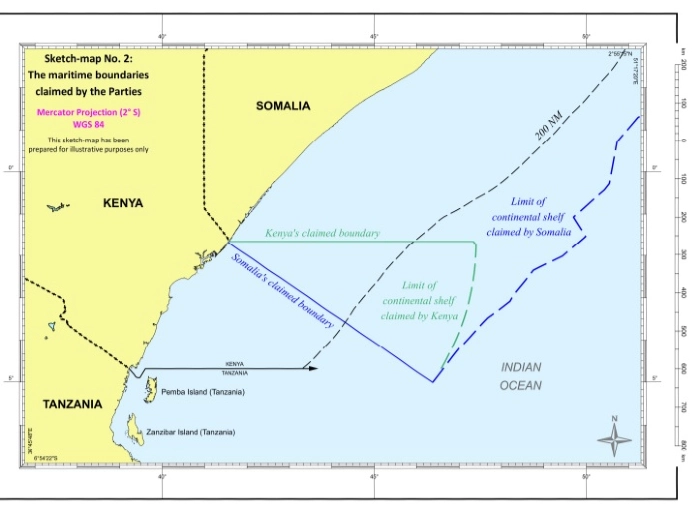By ![]() Ateet Sharma and Mahua Venkatesh
Ateet Sharma and Mahua Venkatesh
The battle lines are being drawn afresh in the strategically located Horn of Africa region after a miffed Kenya has rejected the International Court of Justice (ICJ) maritime ruling which gave Somalia
a major chunk of Indian Ocean territory believed to be highly rich in oil and gas.
Tuesday's judgment, which is final, without appeal and binding on the parties, came after a longstanding dispute between the two countries which began at the ICJ on 28 August 2014 when Somalia instituted proceedings against Kenya with regard to a dispute concerning the delimitation of maritime spaces claimed by both states in the Indian Ocean.
The applicant asserted that "Kenya's current position on the maritime boundary is that it should be a straight line emanating from the Parties' land boundary terminus, and extending due east along the parallel of latitude on which the land boundary terminus sits, through the full extent of the territorial sea, EEZ and continental shelf, including the continental shelf beyond 200 nautical miles".
Kenya had on 7 October 2015, raised preliminary objections to the jurisdiction of the court and the admissibility of the application.
While Somalia argued for unadjusted equidistance line through all maritime areas, Kenya contended that maritime boundary has already been agreed as Somalia acquiesced to boundary following parallel of latitude.
Even before the ICJ spelt out the judgement on Tuesday, Nairobi alleged that the judicial process was biased.
"The decision embodies a perpetuation of the ICJ's jurisdictional overreach and raises a fundamental question on the respect of the sovereignty and consent of States to international judicial processes. International tribunals have jurisdiction only to the extent of consent by a State," Kenyan President Uhuru Kenyatta, said in a statement.
Kenyatta said that over the last decade, a trend has emerged of "some supposedly international organisations, being deployed as political tools against African countries".
He added that "this misfeasance has infected the ICJ", leading it to impose jurisdiction on a dispute it had "neither jurisdiction nor competence".
However, the President also said that Kenya, which keeps a part of the 100,000 square-kilometre area, is committed to a diplomatic solution to the current impasse. Kenya would seek to resolve this matter through the institutions of the African Union such as the African Union Border Programme (AUBP) and also bilateral arrangements to come to a conclusion.
Rich in natural resources, the disputed offshore area which covers approximately 62,000 square miles, has for long been a big reason for the bitter conflict between the neighbours.
"I am thankful to Allah for granting us this historic victory and the fruits of the long struggle of the people and government of Somalia to realize the legal case against the aspirations of the Kenyan leadership to claim part of the Somali Sea," Mohamed Abdullahi Mohamed, President of Somalia, said in a Facebook post.
Even as the Somalis celebrate the verdict, analysts believe that the revised maritime border along the exclusive economic zones may not settle the dispute in a region which is now at a crossroads.
At the centre of global attention for several decades because of a severe food crisis and large-scale displacement, local conflicts over access to and share of natural resources have often resulted in protracted armed conflicts in the region.
A few years ago, the Council of the European Union had acknowledged that the stability of the Horn of Africa and the freedom of navigation from the Indian Ocean through the Red Sea to the Mediterranean, both crucial to Europe, are being put in jeopardy by developments in the Red Sea region.
Somalia was long seen as the epicentre of instability in the Horn of Africa as EU said that the region's geopolitical and economic importance has grown, leading to new opportunities for the countries in the region and their partners.
Also Read: After fresh crackdown on ISIS, Indian oil majors could be back in business in Mozambique




















